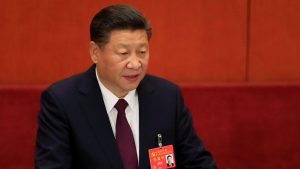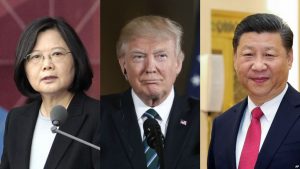 BEIJING: China’s President Xi Jinping has unveiled his plans for rejuvenation of China and the Chinese Dream at the crucial 19th Party Congress, but his foreign policy postures continue to remain a subject of speculation. The Chinese leader has spoken about positioning China at the centre of the world, which indicates growing global ambitions, but at the same time has assured neighbours about peacefully resolving disputes through dialogue.
BEIJING: China’s President Xi Jinping has unveiled his plans for rejuvenation of China and the Chinese Dream at the crucial 19th Party Congress, but his foreign policy postures continue to remain a subject of speculation. The Chinese leader has spoken about positioning China at the centre of the world, which indicates growing global ambitions, but at the same time has assured neighbours about peacefully resolving disputes through dialogue.
While the 18th Party Congress in 2012 echoed the five pillars China’s foreign policy strategy from the previous year’s Congress, namely, relations with major powers, neighbours, developing countries multilateralism and soft power, it was under President Xi’s first term that the ideas of national sovereignty, and rights, along with military supremacy gained renewed emphasis.
Balancing peaceful ties with core interests
At the opening ceremony of the 19th Party Congress, Mr. Xi asserted China’s commitment to uphold the principle of amicable settlement of disputes while at the same time drawing a tough line in case China’s national or strategic interest is threatened.
“No one should expect China to swallow anything that undermines its interests,” he said, drawing a loud applause from over 2,300 attendees.
“China will never pursue development at the expense of others interests, nor will China ever give up its legitimate rights and interests. No one should expect China to swallow anything that undermines its interests,” he stressed.
Xi assured that China would “deepen relations with its neighbours in accordance with the principles of amity, sincerity, mutual benefit and inclusiveness and the policy of forging friendship and partnership”.
“We should commit to settling disputes through dialogue and resolving differences through discussion, coordinate responses to traditional and non-traditional threats and oppose terrorism in all its forms,” Mr Xi said.
Hong Kong and Taiwan

Against the backdrop of secessionist sentiments brewing in Hong Kong, President Xi made it clear that that the policy of “one country, two systems” will be upheld. Beijing’s tightening of authority over Special Administrative Regions like Hong Kong and Macau hardly comes as a surprise given its wider emphasis on national unity and development.
The issue of Taiwan was also mentioned with a call the return of the self-governing island to Chinese control. Recalling the importance of the “1992 Consensus”, or the “One China principle, Mr. Xi declared: “We have a firm will, sufficient faith, and adequate capacity to defeat any intention of “Taiwan independence” in any form. We will never allow anyone, any organization, or any political party, at any time or in any form, to separate any part of Chinese territory from China”.
Military Modernization
A massive military modernization was kicked off in late 2015 by overhauling the command and control system and cutting down on additional personnel. At the 19th Party Congress, President Xi set 2035 as the target year for achieving complete modernization. “A military is built to fight,” Mr. Xi said. “Our military must regard combat capability as the criterion to meet in all its work, and focus on how to win when it is called on.” The number of naval troops will be substantially increased given Chinese ambitions in the South China Sea and the Indian Ocean region.
US response
Us Secretary of State Rex Tillerson has come out strongly against China’s “provocative actions” in the South China Sea and its international infrastructural and investment projects, calling them as direct challenges to the US. Reacting to these remarks, Chinese Foreign Ministry spokesperson Lu kang hit back saying, “We hope that the United States can put China’s development and China’s positive role in the world into perspective, abandon its biased views of China, and make concerted efforts with China to focus on cooperation, properly handle differences, and maintain the momentum of the steady growth of China-US relations”. The upcoming visit of President Donald Trump to China in November will provide concrete pointers towards how Xi Jinping plans to recalibrate relations with China.
Author Profile
- India Writes Network (www.indiawrites.org) is an emerging think tank and a media-publishing company focused on international affairs & the India Story. Centre for Global India Insights is the research arm of India Writes Network. To subscribe to India and the World, write to editor@indiawrites.org. A venture of TGII Media Private Limited, a leading media, publishing and consultancy company, IWN has carved a niche for balanced and exhaustive reporting and analysis of international affairs. Eminent personalities, politicians, diplomats, authors, strategy gurus and news-makers have contributed to India Writes Network, as also “India and the World,” a magazine focused on global affairs.
Latest entries
 DiplomacyJanuary 5, 2026India walks diplomatic tightrope over US operation in Venezuela
DiplomacyJanuary 5, 2026India walks diplomatic tightrope over US operation in Venezuela India and the WorldNovember 26, 2025G20@20: Africa’s Moment – The Once and Future World Order
India and the WorldNovember 26, 2025G20@20: Africa’s Moment – The Once and Future World Order DiplomacyOctober 4, 2025UNGA Resolution 2758 Must Not Be Distorted, One-China Principle Brooks No Challenge
DiplomacyOctober 4, 2025UNGA Resolution 2758 Must Not Be Distorted, One-China Principle Brooks No Challenge India and the WorldJuly 26, 2025MPs, diplomats laud Operation Sindoor, call for national unity to combat Pakistan-sponsored terror
India and the WorldJuly 26, 2025MPs, diplomats laud Operation Sindoor, call for national unity to combat Pakistan-sponsored terror







